The weird world of a Kim Jong-un impersonator
- Published
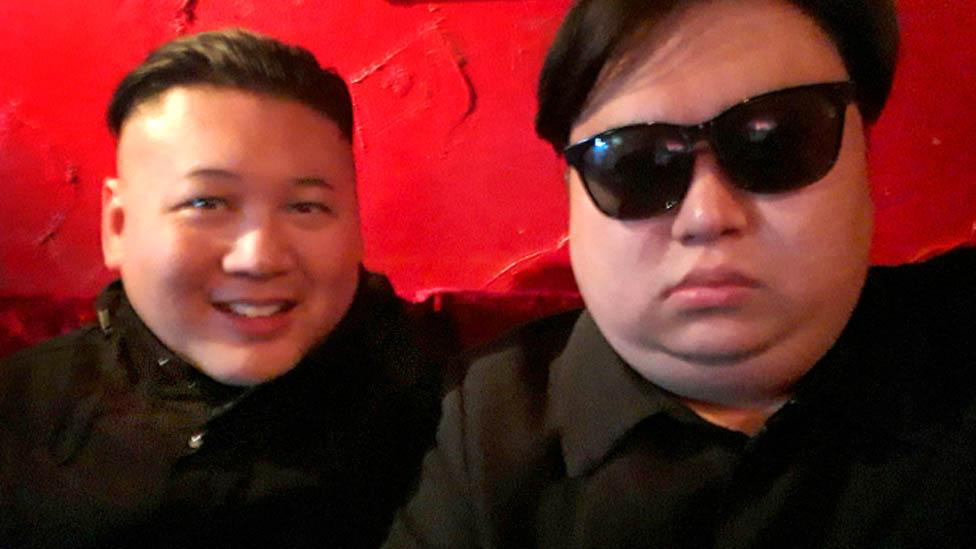
Howard and Minyong
Kim Jong-un has had his fair share of headlines in 2018, be it for threatening nuclear Armageddon, jousting verbally with Donald Trump, or signing peace agreements. But every time he makes the news, two very unlikely beneficiaries prepare for their phones to start ringing, writes David Cox.
Howard X, a political satirist living in Hong Kong, and Seoul-based Minyong Kim - who goes by the professional name of Dragon Kim - are the only members of what they call the Kim Jong-un Impersonators Union.
For the past six years, the duo have each been cashing in on their uncanny resemblance to the North Korean leader - earning up to £10,000 a day, they say, for jobs ranging from starring in video games, opening shopping malls, and entertaining guests at billionaires' birthday parties.
"Whenever Kim Jong-un does something like firing off a missile or calling Trump a 'dotard', then my phone goes with a job," Howard says. "It's always last minute, sometimes just 24 hours notice. And it can be absolutely anything."
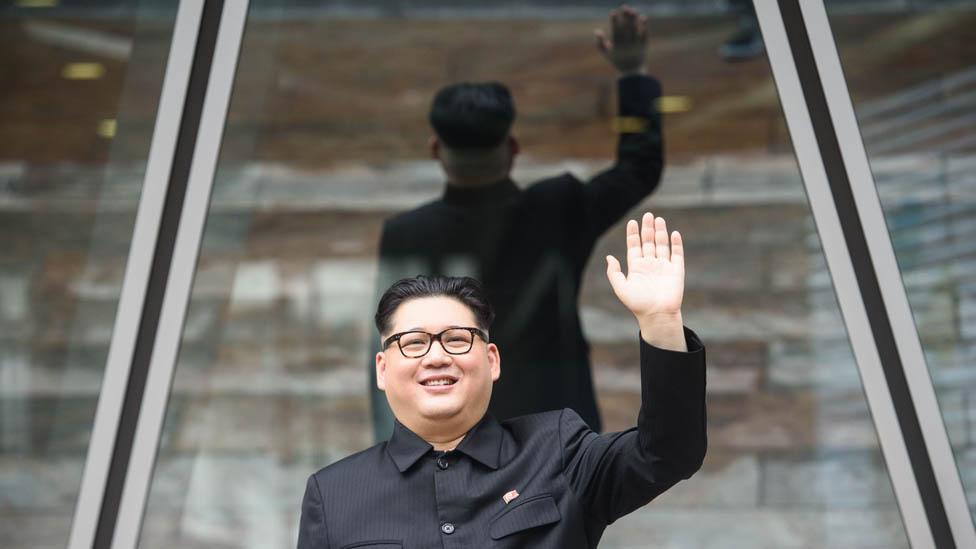
Howard X as Kim Jong-un
Minyong is in negotiations with Kentucky Fried Chicken about shooting a new commercial, while Howard was recently hired to appear at an event in Macau together with Trump and Putin impersonators. "They had a cake shaped as a big missile and the three of us had to crack it open," he says.
When Kim Jong-un first came to power in December 2011, Minyong was still doing military service in South Korea.
"It was really stressful," he remembers. "Every time Kim Jong-un would do or say something, my seniors and juniors would come to me and say, 'It's all because of you, you look like him.'"
Having finished military service, though, he decided to try and embrace his resemblance to the North Korean leader. For Halloween, he persuaded an embarrassed local barber to give him Kim Jong-un's trademark haircut, bought a cheap black suit and headed out into Seoul's trendy Hongdae district.
He soon found himself mobbed.
"I literally had thousands of people taking photos of me and the next day I ended up all over TV," he says. "Within a month I had companies requesting to shoot commercials with me."
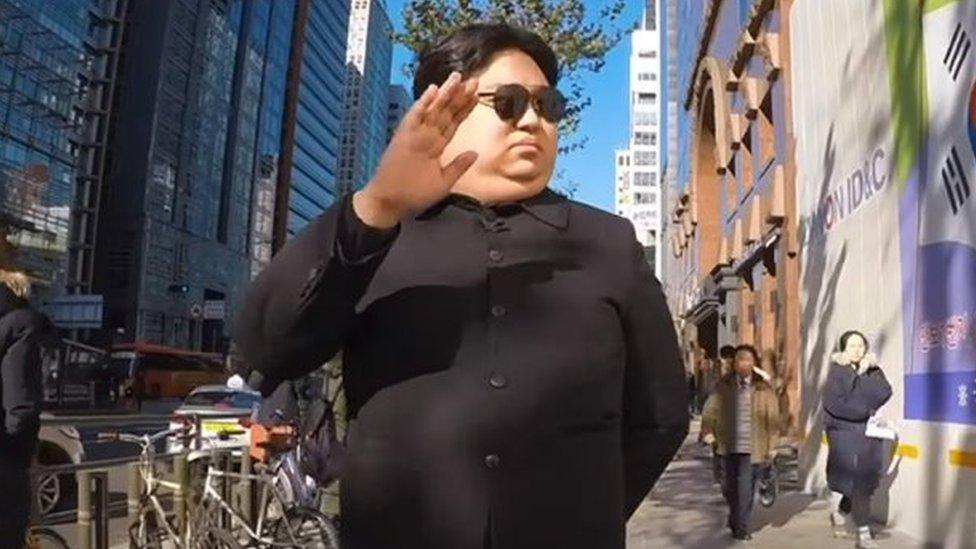
Howard tells a similar tale of overnight fame, which began when he posted photos of himself as Kim on Facebook, one April Fool's Day. The pictures went viral and kickstarted his career, but he then faced a struggle to get the haircut right.
"It was initially tricky as it's extremely hard to find a picture of the back of his head. But I did my research, printed out a load of photos, took them to a local guy and after a bit of experimenting, he perfected the look. He's now my regular stylist," he says.
"But he's had to adjust his usual way of cutting in order for me to look this ridiculous - apparently it goes against every single rule for a good haircut."
Looks aside, the two impersonators have very different approaches to the job. Minyong - who dreamed of being an actor as a teenager before pursuing an economics degree - is a master of accents who has perfected Kim Jong-un's precise dialect and vocal mannerisms to create as realistic a portrayal as possible.
Howard, who grew up in Australia and speaks no Korean, is unashamedly provocative. His antics have ranged from asking shocked Singaporeans, "Who's the better-looking dictator, me or your prime minister?" while opening a chilli crab restaurant, to starring in a music video produced by Russian rave band Little Big, where he falls in love with, and goes to bed with, a nuclear bomb.
"As an actor impersonating a bad guy, you can do stuff which, for example, an Obama impersonator could never get away with," Howard says. "So there's no bottom for me. I can say the most outrageous, politically incorrect thing, and it would be funny because it's coming from the character of Kim Jong-un."
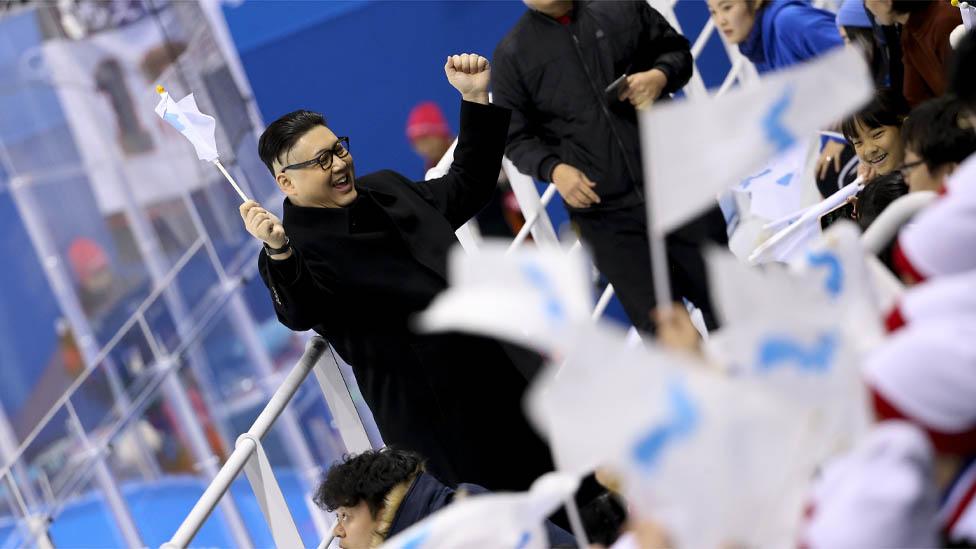
Howard X at the 2018 Winter Olympics
At this year's Winter Olympics he infuriated the North Korean delegation by appearing at different venues in front of their cheerleaders, waving the national flag. He was ultimately manhandled out of the ice hockey stadium.
"I had no idea what they were saying at the time, but a translator later told me, they were shouting, 'How dare you do this,'" Howard remembers. "Dictatorships don't have a sense of humour."
It isn't only the North Koreans who don't see the funny side. Minyong has faced criticism from South Korean charity workers trying to help North Korean refugees who have fled their country. "They're worried that by us doing this, people might develop a more positive image of Kim Jong-un," he says. "They say that would be really humiliating for people who have escaped North Korea and suffered under his government."
Impersonating a dictator does come with its risks.

The real Kim Jong-un in September 2017
During one trip to New York, Minyong was nearly assaulted by a member of the public who tried to punch him, believing he was actually the North Korean leader. It was only his friends, dressed as Kim Jong-un's bodyguards, who stepped in and restrained the assailant.
In addition, Minyong says his growing profile across Asia has brought him to the attention of North Korean intelligence services.
"One day, I found that my personal email account had been hacked," he recalls. "And my password is pretty complicated, and I'd never changed it. I checked the IP address for where it was last logged on, and it was somewhere in China. I reported it to the national intelligence agency and they said it was North Korean spies."
Minyong says he briefly considered quitting altogether at the request of his family and friends.
In 2014, South Korean TV reported that North Korea had warned that anyone impersonating Kim Jong-un would be punished. But Minyong found he couldn't turn his back on the money and media attention. So instead, he tries to fly beneath the radar by avoiding saying anything overly political.
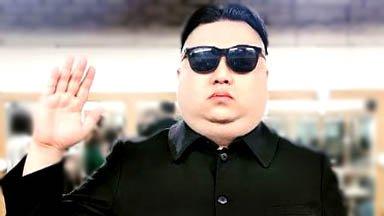
"I figured out that if I'm doing this, and objecting to Kim Jong-un's policies and saying bad stuff about him, I may possibly get killed or kidnapped," he says.
Howard, on the other hand, is pretty bullish about any potential threats. The North Koreans can't do anything to him, he insists.
"The blowback would be too much for them. I'm actually kind of disappointed that Minyong's been hacked and not me, because I've done far more than him, in terms of being insulting to the leader."
Howard is actually more concerned about the fact that Minyong has often been willing to work for far cheaper rates, driving down his own potential earnings. Minyong also sometimes dresses up as Kim Jong-un for nights out in Seoul even when he's not being paid.
"When I go downtown I usually dress up as Kim Jong-un, because I'm so popular that I don't even need to bring my wallet," Minyong says. "Bar owners always give me free food and drinks, people buy me food and drinks, and I get free entry and queue jump to all the famous clubs."
Howard, however, isn't amused. "I refuse to do that kind of thing because it kind of cheapens the impersonation when you're working for free," he says. "I want dollars."
Howard and a Donald Trump impersonator go hand-in-hand in Singapore
Howard has an unlikely ally in the shape of Minyong's long-term girlfriend. She detests her boyfriend's career as a Kim Jong-un impersonator, and has begun to limit his public appearances.
"I'd dress up as Kim Jong-un every day but my girlfriend hates the hairstyle," Minyong admits.
"She complains every time I get a new haircut. She also hates it because when I go to bars and clubs, girls want to take photos with me, and sometimes try to hug and kiss me. We began dating before all this, and she tells me that if she knew I was going into this line of work, she never would have gone out with me. So I'm trying to minimise it and just accept things which pay really well, in order to keep her happy."
But the stream of highly paid jobs shows no sign of drying up.
"I told the Trump impersonator, you'd better make good money now because you've only got four, maybe eight years if you're lucky," Howard says. "But these dictators, it's a job for life. Unless he dies of high cholesterol or diabetes, I reckon I've got a good 30 years."
You may also like:
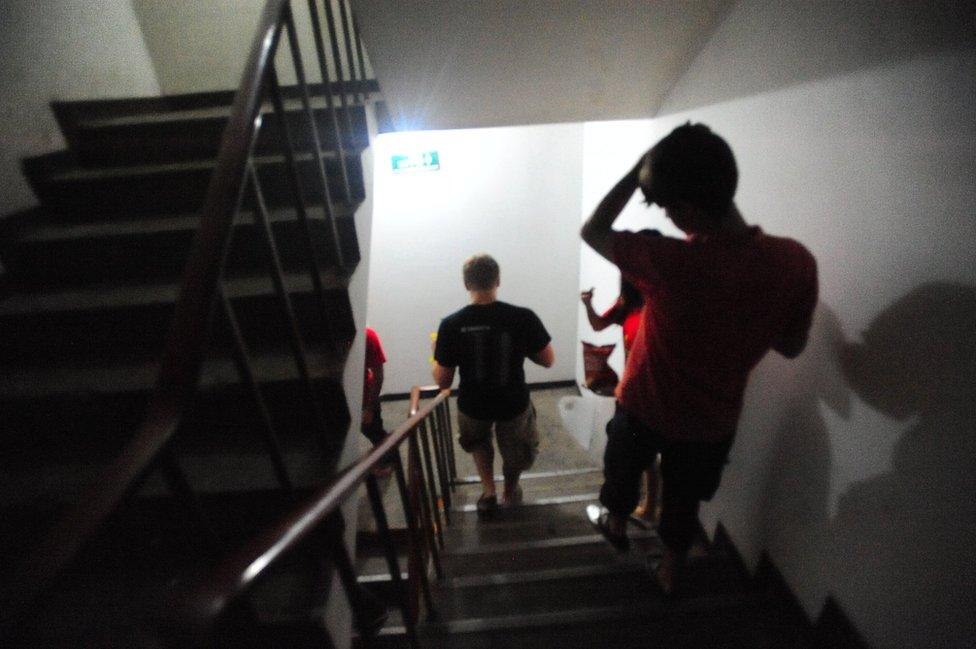
For their five-night stay at the Yanggakdo International Hotel in Pyongyang, Calvin Sun and the other members of his group had been supervised by their guides. Now was their last opportunity to explore the building alone. They made their way to the open rooftop and to the revolving restaurant on the top floor. Someone then noticed that the button for the fifth floor was missing...
READ: The man who went to the North Korean place that 'doesn't exist'
Join the conversation - find us on Facebook, external, Instagram, external, YouTube, external and Twitter, external.
